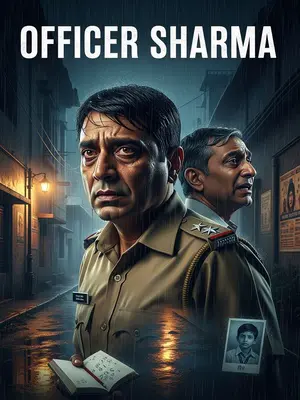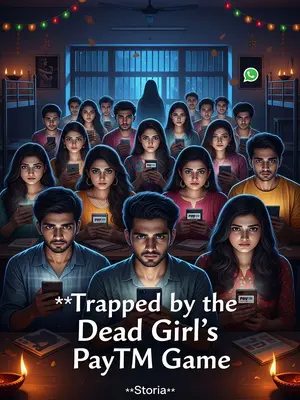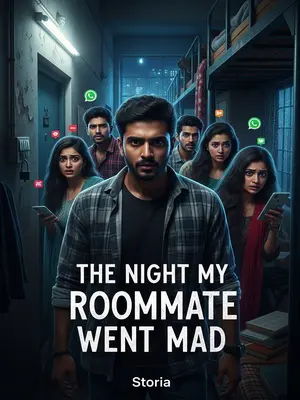Chapter 2: The Fantasy and the Curse
Many people must have had this kind of daydream at school:
After finishing an exam, they imagine travelling through time and space, returning to before the test to search for the answers, and then joyfully scoring a perfect paper. It’s a fantasy we all share—even the backbenchers who never study, even the toppers who act like they don’t care—everyone’s wished for one more chance. You might think this is an enviable ability. But only I know—it’s a terrifying cage that can drive someone mad.
Ever since class 9, I have possessed a conceptual-level superpower: the time loop.
I still remember—it was just an ordinary monthly test. The teacher stood at the podium, reading out scores one by one. When I heard, "Rohan, 529 marks, 226th in the batch," I suddenly found myself transported back to a week before.
It was like some mysterious mantra: as soon as it was spoken, I would travel through time. The classroom, the blackboard with chalk dust, the faint smell of Dettol from the morning mopping—all of it would dissolve, replaced by the same Monday morning a week earlier.
At first, I was shocked and excited, checking the date with my benchmate again and again. After confirming I’d really returned to a week before the test, I felt as if I’d stumbled upon a priceless treasure. I still remember the look on Aniket’s face as I pestered him for the date, then asked again five minutes later—he just muttered, 'Pagal ho gaya hai kya, Rohan?'
It was like having a cheat code for life—who wouldn’t envy that?
I pulled out the question paper, wrote down every question I’d missed, and crammed all the relevant chapters in that week. The smell of ink and the sound of rustling pages kept me company through late nights, as Amma scolded me for burning the midnight oil and made me drink badam doodh to help me focus.
Then, brimming with confidence, I walked into the exam hall. My shoes squeaked on the floor, my shirt neatly ironed—Ma had made sure of that. I could feel the eyes of the toppers on me, but for the first time, I didn’t care.
As expected, this time my results washed away my shame—"Rohan, 668 marks, 25th in the batch."
But the next second, as soon as the teacher finished reading the scores, my vision went black again. It was as if the entire classroom—chalk dust, sunlight, the smell of old books—vanished in an instant, leaving me in darkness.
When I opened my eyes, I was back to a week before the test. I checked the calendar on my phone—again. Same date. Same day. Same sinking feeling.
Compared to the excitement of my first trip through time, this time I felt only confusion.
Why hasn’t the loop ended? Was my score not high enough? Did I miss something? I kept replaying the moments in my head, restless under the white tube light flickering above my study table. Amma’s pressure cooker whistled in the kitchen, the smell of dal mixing with my anxiety as I tried to memorize the answers.
So, I began to study even harder, constantly improving my marks. I used every method to force myself to memorise the solutions to every wrong answer, even memorised the entire question paper. Amma shook her head, worried, 'Beta, don’t take so much tension. Zyada padhai se dimag kharab ho jayega.'
"Rohan, 712 marks, top five in the batch."
But once again, I was pulled back to a week before. The calendar app became my only friend, marking the same week over and over.
The terror of looping began to spread within me.
I tried to seek help—from my parents, my teachers, even my most trusted friends. But no one believed me. Everyone just thought I was under too much pressure, having some kind of mental breakdown. My father, sitting in the cane chair on the verandah, told Amma, 'Ye bacche aajkal na, ekdum sensitive ho gaye hain.'
I even tried to prove myself using knowledge from the future. That time, I secretly wrote down a string of lottery numbers that would be drawn after school and gave them to the class teacher the next day.
At first, he was full of disbelief. But as the numbers were announced one by one, his expression grew increasingly complicated. The other teachers started whispering in the staff room, eyeing me as if I were some child prodigy—or a fraud.
The matter was quickly reported to the principal and even alerted higher authorities. A week later, I was sent by a special car to Mumbai, where I lived in a sea-facing apartment. The apartment smelled of fresh paint and sea breeze, but to me, it was just another cage. The waves outside my window felt like a taunt, not a comfort.
More than a dozen top doctors began to study my brain. They subjected me to countless scans and tests, trying to uncover the pattern of the loop. Every morning, I was poked and prodded, asked the same questions, while nurses in crisp white uniforms brought me tasteless hospital food.
From then on, my life became extremely monotonous: a fixed daily routine—eat, be studied, sleep. Surrounded by countless machines and watched by cold-eyed scientists, I was forced to repeat the loop again and again in the lab. Not even the sound of the sea, the only thing left from the world outside, could drown out the monotony.
They thought they could find a solution, but they completely underestimated the true nature of this power.
When I was pulled back from the lab to the school classroom again, I lost all hope. The whiff of chalk and the buzz of the fans above were both a relief and a curse.
This wasn’t a problem science could solve. No outside force could help me. The stethoscopes and MRIs and stern faces had all failed.
Even death couldn’t end the loop. I remember gripping the cold metal railing of the hospital balcony, watching a chaiwala pour tea into glass tumblers below. The world carried on, untouched by my misery. I didn’t jump, but even if I had, I knew I’d only wake up again in that same classroom.
I was in despair. Utter, bone-deep despair that not even my mother’s soft hand on my shoulder could ease.






